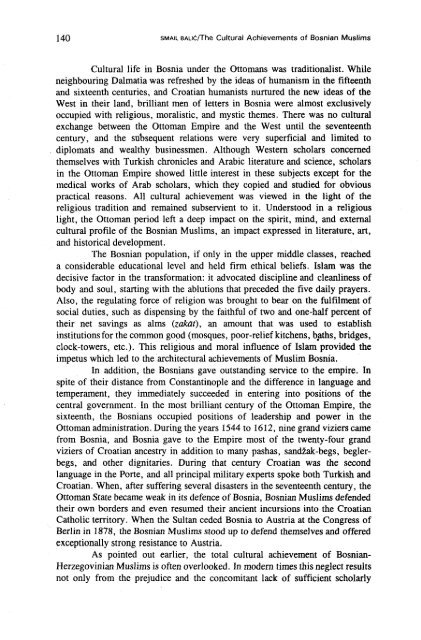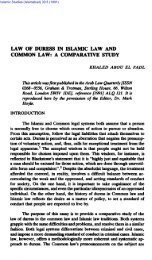You also want an ePaper? Increase the reach of your titles
YUMPU automatically turns print PDFs into web optimized ePapers that Google loves.
140 MAIL BALICIT~B Cultural Achievements of Bosnian Muslims<br />
Cultural life in Bosnia under the Ottomans was traditionalist. While<br />
neighbouring Dalmatia was refreshed by the ideas of humanism in the fifteenth<br />
and sixteenth centuries, and Croatian humanists nurtured the new ideas of the<br />
West in their land, brilliant men of letters in Bosnia were almost exclusively<br />
occupied with religious, moralistic, and mystic themes. There was no cultural<br />
exchange between the Ottoman Empire and the West until the seventeenth<br />
century, and the subsequent relations were very superficial and limited to<br />
diplomats and wealthy businessmen. Although Western scholars concerned<br />
themselves with Turkish chronicles and Arabic literature and science, scholars<br />
in the Ottoman Empire showed little interest in these subjects except for the<br />
medical works of Arab scholars, which they copied and studied for obvious<br />
practical reasons. All cultural achievement was viewed in the light of the<br />
religious tradition and remained subservient to it. Understood in a religious<br />
light, the Ottoman period left a deep impact on the spirit, mind, and external<br />
cultural profile of the Bosnian Muslims, an impact expressed in literature, art,<br />
and historical development.<br />
The Bosnian population, if only in the upper middle classes, reached<br />
a considerable educational level and held firm ethical beliefs. Islam was the<br />
decisive factor in the transformation: it advocated discipline and cleanliness of<br />
body and soul, starting with the ablutions that preceded the five daily prayers.<br />
Also, the regulating force of religion was brought to bear on the fulfilment of<br />
social duties, such as dispensing by the faithful of two and one-half percent of<br />
their net savings as alms (zuluit), an amount that was used to establish<br />
institutions for the common good (mosques, poor-relief kitchens, b$ths, bridges,<br />
clock-towers, etc.). This religious and moral influence of Islam provided the<br />
impetus which led to the architectural achievements of Muslim Bosnia.<br />
In addition, the Bosnians gave outstanding service to the empire. In<br />
spite of their distance from Constantinople and the difference in language and<br />
temperament, they immediately succeeded in entering into positions of the<br />
central government. In the most brilliant century of the Ottoman Empire, the<br />
sixteenth, the Bosnians occupied positions of leadership and power in the<br />
Ottoman administration. During the years 1544 to 1612, nine grand viziers came<br />
from Bosnia, and Bosnia gave to the Empire most of the twenty-four grand<br />
viziers of Croatian ancestry in addition to many pashas, sandiak-begs, begler-<br />
begs, and other dignitaries. During that century Croatian was the second<br />
language in the Porte, and all principal military experts spoke both Turkish and<br />
Croatian. When, after suffering several disasters in the seventeenth century, the<br />
Ottoman State became weak in its defence of Bosnia, Bosnian Muslims defended<br />
their own borders and even resumed their ancient incursions into the Croatian<br />
Catholic territory. When the Sultan ceded Bosnia to Austria at the Congress of<br />
Berlin in 1878, the Bosnian Muslims stood up to defend themselves and offered<br />
exceptionally strong resistance to Austria.<br />
As pointed out earlier, the total cultural achievement of Bosnian-<br />
Herzegovinian Muslims is often overlooked. In modern times this neglect results<br />
not only from the prejudice and the concomitant lack of sufficient scholarly
















